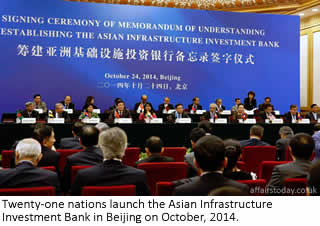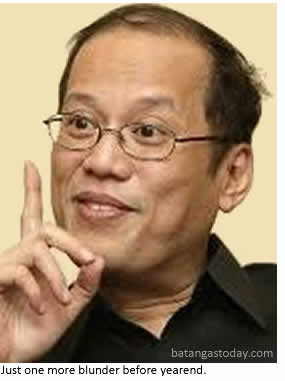|

 ith
the 2015 deadline just a day away, Philippine President Benigno Aquino
III threw in the towel and announced that the Philippines would join the
Beijing-sponsored Asian Infrastructure Investment Bank (AIIB) as its
final founding member. Critics of the new international bank argue that
it is China's way of grabbing some of the limelight away from the World
Bank (WB) and the Asian Development Bank (ADB), both of which are
already doing what the AIIB intends to do. The major difference is that
the two older banks (WB and ADB) are primarily funded by the United
States and Japan respectively, while China will be the AIIB biggest
funder. ith
the 2015 deadline just a day away, Philippine President Benigno Aquino
III threw in the towel and announced that the Philippines would join the
Beijing-sponsored Asian Infrastructure Investment Bank (AIIB) as its
final founding member. Critics of the new international bank argue that
it is China's way of grabbing some of the limelight away from the World
Bank (WB) and the Asian Development Bank (ADB), both of which are
already doing what the AIIB intends to do. The major difference is that
the two older banks (WB and ADB) are primarily funded by the United
States and Japan respectively, while China will be the AIIB biggest
funder.
According to Philippine
Finance Secretary Cesar Purisima, the country needs close to $130
billion to finance infrastructure projects over a 10-year period. With
the establishment of the AIIB the Philippines hopes to tap a new source
of funding for such projects.
However, if only the
country can reduce the level of corruption and more judiciously allocate
the billions of dollars remitted annually by overseas Filipinos, there
might be more than enough to fund the country's infrastructure
development requirements.
Slick operators like
Janet Napoles, who is accused of funneling billions of pesos earmarked
for development projects, into her own pockets, deprive the country of
those much needed funds. Napoles is said to have created hundreds of
bogus Non-Governmental Organizations (NGOs), that received billions from
the government. Instead of those funds going into countryside
development projects, they were pocketed by Napoles and shared with her
equally corrupt benefactors in the Philippine House and Senate.
The Philippine economy
today is like a bucket of water with lots of holes in it. Plug those
holes and the country might have more than enough to fund its way into
first-world status. In October 2015 alone, cash remittances from
Overseas Filipino Workers (OFWs) totaled $2.2 billion. And for the first
10-months of 2015, a total of $20.6 billion was received—up 3.7 percent
from the previous year.
So Filipinos need to
discard their mendicant mentality and start taking themselves seriously.
Today we approach other countries, hat in hand, expecting a handout. Are
we always to be the recipient of foreign aid? Will we ever be able to
pay our own way, and stand on our own two feet?
The Filipino masses
have once again come to the country's rescue like they did during the
EDSA People's Power Revolution in 1986. This time it is the tens of
millions of OFWs slaving away in faraway lands who are keeping the
economy strong and robust—not the lackadaisical local businessmen who
usually think in get-rich-quick terms.
With the OFWs sending
back billion of dollars each and every month, the Philippines does not
need to be part of China's AIIB. The AIIB will just be another way for
China to dictate to the Philippines and meddle in our economic affairs. The
WB and the ADB will more than suffice given our significant remittance
receipts.

Aquino significantly
bolstered China's standing in the region by signing on to the AIIB. At
the same time he thumbed his nose at the U.S. and Japan (both of which
have voiced skepticism about the AIIB). Aquino has really done a great
disservice to the Filipino people by allying with China even after that
country forcibly took territory in the West Philippine Sea (South China
Sea) that is part of the Philippines. And although Aquino leaves office
next year, his successor as well as Filipinos in general will be seen as
a people who do not take a stand. In Pilipino: namamangka sa dalawang
ilog (two-timing or fence sitting).
In addition, China can
even use Aquino's action to argue before the Arbitral Tribunal in the
Hague that the Philippines' desire to be part of the AIIB is proof of
the country's acceptance of China's sovereignty over the reefs and
shoals in the West Philippine Sea. What a way to end the year!
Manigong Bagong Taon,
A Happy New Year to all! Published 12/31/2015 |